Saving Pasacao as summer capital
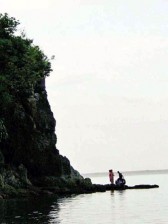
TOURISTS admire the rocky cliff at a cove in Caranan village, Pasacao, Camarines Sur. PEDRO PASABA/CONTRIBUTOR
As the Philippine tourism bandwagon went full speed to portray the country as a fun place, one coastal town in Camarines Sur has been left behind.
Blessed with long, uninterrupted seashore, a bird-watching area, a rock islet amid clear seawater, and rich coral reefs at a fish sanctuary, Pasacao is just getting by at the peak of summer while tourism destinations elsewhere in the province are hosting hordes of visitors year round.
Mayor-elect and outgoing councilor Niño Tayco cites several factors why the town, 38 kilometers southwest of Naga City, is unable to live up to its title of “summer capital of southern Luzon.”
The local government, he says, has failed to address issues like road repair, promotional strategies, employment of staff members for beach safety and cleanliness, and the creation of a tourism office.
Unspoiled beaches
Article continues after this advertisementIn the mid-1990s, Pasacao was one of the booming tourist spots in Bicol. Its unspoiled beaches were some of the most visited swimming sites because they offered cheap rates.
Article continues after this advertisement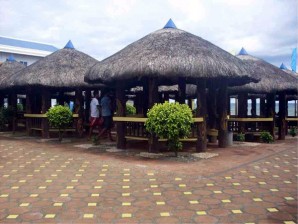
MODERNIZED beach cottages for rent in resorts in Pasacao, Camarines Sur, stand empty as the peak season slips away. SHIENA BARRAMEDA/INQUIRER SOUTHERN LUZON
A resort owner, Wilfredo Bicomong, says transportation was then easy and the resorts charged as little as P10 entrance fee per person and sometimes nothing for repeat visitors and friends.
Bicomong, head of the Beach Resort Owners’ Association in Pasacao, says the beach rates have not changed in the last 25 years. For as low as P400 to P500 for cottage rental, entrance fee and fare, an entire family can already enjoy the beach for a day, he says.
Two villages, Caranan and Balogo, have long gray beaches dotted with mangrove forests and coral reefs.
Bicomong’s resort, Villa Consuelo, located in Caranan, is one of the oldest, having started around 1990 with a few cottages made of nipa and coconut lumber sprouting along the Magtabid beach.
Villa Consuelo and neighboring resorts made Pasacao a popular tourism spot in Bicol during the term of Mayor Jun Lee-Oliver in 1995.
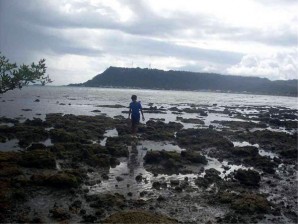
A CHILD stands over a coral reef during low tide in Balogo, Pasacao, Camarines Sur, looking for tiny crabs. SHIENA BARRAMEDA/INQUIRER SOUTHERN LUZON
During peak seasons, Bicomong would welcome at least 800 visitors per day but during off seasons, the resort would be lucky enough to fill one cottage with 24-30 persons per day.
Caranan also has Stampa Beach, a pebble beach on a fish sanctuary which was recently declared a protected site by the Bureau of Fisheries and Aquatic Resources. Nearby is a bird-watching area.
In the same village, near the fish port, 10 to 15 minutes by boat away, is the rock islet of Daruanak, which is still drawing crowds because of its clear waters akin to the pristine waters of Calaguas Island in Camarines Norte and El Nido in Palawan.
Cleanliness
Tayco says the most pressing problems in Pasacao are the unregulated marketplace in the town center and unsanitary garbage collection.
“Cleanliness remains an issue on Pasacao’s shores because leaves and soil falling from the hills and mountains during the rainy season mix with trash from residents and litter the swimming areas,” he says.
Although there are municipal ordinances for tourism development, these are not implemented due to political squabbles among local and sectoral leaders in the past, Tayco says.
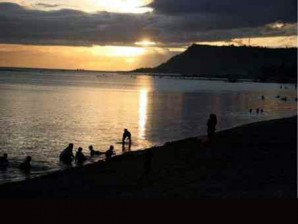
SHORELINE of Caranan village, Pasacao, Camarines Sur PEDRO PASABA/CONTRIBUTOR
He says the removal of features that used to be present in the beaches like the so-called “bay watchers” or lifeguards by the Beach Resort Owners’ Association, may have turned away visitors.
Tayco also cites the lack of light posts along roads leading to beaches in Balogo.
Joebet Galang, manager of Maria Maruja Beach Resort in Balogo, says the safety of a tourist who comes and leaves the gates of his establishment is also a concern.
During summer, the resort is probably one of the largest swimming spots in the town apart from Surfer’s Paradise in Caranan, as it receives around 1,500 visitors per day.
Marketing
Galang says another problem is the lack of promotion as his resort relies only on word of mouth and marketing through social media.
“We do our own marketing. We don’t really have much help from other sectors,” he adds.
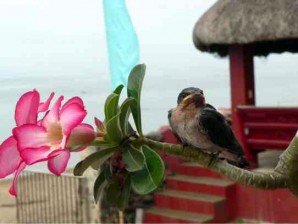
A BIRD stares curiously at the camera during a quiet morning in an almost empty beach resort in Pasacao, Camarines Sur. PEDRO PASABA/CONTRIBUTOR
The majority of visitors, he says, are families and groups of friends with very few tourist groups put together by tour or travel operators.
Galang says the establishment of a municipal tourism office will really “mean a lot to us.”
Travel agencies and tour operators in Bicol do not include trips to Pasacao in the lists of packages being endorsed by the Bicol Association of Tour and Travel Operators (Batto).
Batto president Darius Mirasol, who is also a travel agency owner based in Camarines Norte, says the group has left Pasacao alone because it does not get updates on tourism efforts or tourists spots in the town.
Other groups, however, like the Metro Naga Development Council, are striving to increase tourist arrivals in Pasacao by organizing “familiarization tours” with operators and travel agencies in Bicol.
Tayco, who will be sworn into office in July, says he plans to establish the tourism office, which he believes would set the ball rolling for tourism in the town.
“We have a lot of potential and I believe if we are able to package and market these to the world, we will be able to live up to our name as the ‘summer capital of southern Luzon,’” the incoming mayor says.